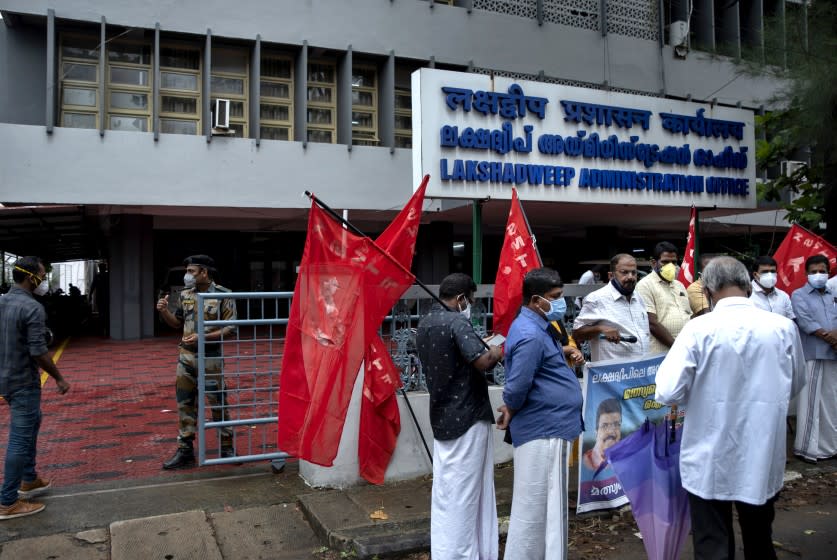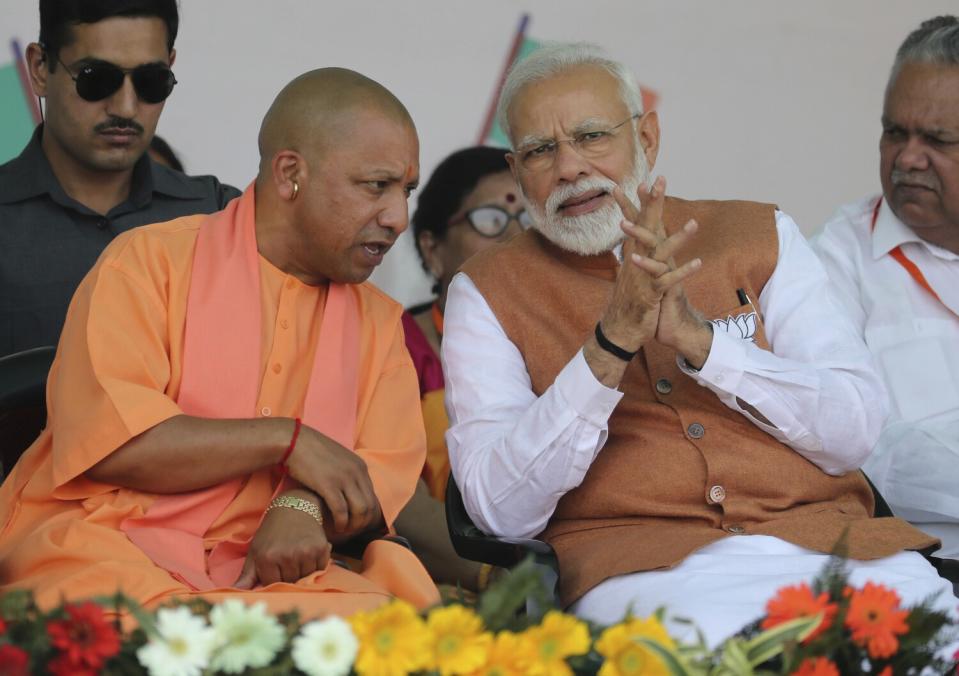An Indian island paradise escaped COVID-19. Then a Hindu nationalist official arrived

- Oops!Something went wrong.Please try again later.
For 44 years, Nijamuddin K. lived his life in peace on Kavaratti, a sandy atoll surrounded by turquoise water 200 miles west of India’s Malabar coast.
On a good day, when the winds cooperated and the fish were running, he could take his wooden boat with the creaky motor out to sea and catch up to 60 tuna. Steady demand for the prized fish on the Indian mainland made him the breadwinner for an extended family of 14.
The turbulence of modern India has long eluded Kavaratti and the 35 other flecks of idyllic tropical land scattered across the Arabian Sea and known as Lakshadweep. That serenity was upended in December, when a newly appointed administrator for the federal territory named Praful Khoda Patel visited the archipelago following the death of his predecessor.
Patel lifted restrictions on travel to the islands that had kept Lakshadweep remarkably free of COVID-19. The relaxation came just as India’s disastrous second wave was developing, resulting in a sudden and deadly outbreak in the island community.

But what sparked protests and turned this rarely noticed collection of reefs into national news was prompted when Patel, a loyalist of Prime Minister Narendra Modi’s Hindu nationalist Bharatiya Janata Party, or BJP, introduced sweeping plans to overhaul life in the Muslim enclave. It was as if the targeting of Muslims that has riven the mainland in recent years had suddenly made its way across the sea.
Without consulting anyone in Lakshadweep, Patel proposed giving the government unchecked powers to seize property and relocate residents in the name of developing the island chain into a tourist destination that could rival the nearby Maldives.
He then suggested a ban on beef and a lifting of prohibitions on alcohol, an affront to local religious sensibilities. Patel also wanted to bar anyone with more than two children from running for local elections, a move widely seen as a ploy to weaken the political standing of Muslims, who make up 95% of the population.
Patel also wants to hand authorities the power to detain anyone without public disclosure for up to a year — a rule more commonly used in parts of India with national security concerns, not a place like Lakshadweep where there’s virtually no crime.
“It’s no secret they want to eradicate our community,” said Nijamuddin. “It makes me angry and sad. They could have learned about our lifestyle and culture instead of imposing all these rules.”
Nijamuddin’s problems began on April 27 when workers employed by the federal government demolished his beach shed and disconnected his electricity supply without warning. The government has been clearing beachfront land in Kavaratti and other inhabited islands in Lakshadweep, declaring structures like sheds illegal.
Nijamuddin had dipped into his savings to construct the shed made of bamboo and coconut leaves to store his fishing nets and shelter his boat when it needed repair. The vessel still has a gash on its bow from Cyclone Tauktae earlier this year.
The following month, Nijamuddin’s 75-year-old father died of COVID-19. He had been struggling to breathe for weeks, but there was little doctors could do at a government hospital overwhelmed by patients and short on beds.
“We used to feel safe here because there were no cases while there were millions in other parts of India,” said Nijamuddin, who suspects everyone in his family has been infected, most asymptomatically.
Lakshadweep’s residents are now under lockdown to contain a wave of COVID-19 that’s infected more than 9,000 people and killed at least 46, making it one of the worst outbreaks in India on a per capita basis.
Unable to fish, Nijamuddin has had to borrow money from friends and relatives to make ends meet. Growing signs of a third wave in India mean Lakshadweep could be months from recovery.
“I have a family of 14 people to feed and fishing is the only way of earning money,” Nijamuddin said. “Now that is also taken away and I don’t know how I am going to survive.”
The father of two was so frustrated that he joined the so-called Black Day protest on June 14 organized by local activists. Thousands of island residents wore black in solidarity and posted signs outside their homes that read “Go back Patel.”
More demonstrations have followed, including a hunger strike. The hashtag #SaveLakshadweep has been trending in India. Authorities have responded to the uproar by arresting nearly two dozen demonstrators.
Patel, who could not be reached for comment, has defended his plan by saying the “BJP administration is trying to uplift the lives of coconut growers and fishermen of the island.”
He said the stringent security laws are needed “so that youth are not misguided.”
Residents don’t believe they will benefit from Lakshadweep’s development of luxury hotels. They say they are being pushed aside because of their faith.
Under the Modi government, Muslims have been increasingly marginalized in a country where they make up 14% of the population. They’ve been targeted by police and violent mobs. And in a bid by Modi’s ruling party to make India more of a Hindu nation, many could be rendered stateless by a citizenship law that excludes Muslim migrants.
Human rights activists say Patel epitomizes Modi’s imprint on the world’s largest democracy by suppressing dissent and ignoring the interests of Lakshadweep’s Muslim population to advance his party’s ideology.
“Lakshadweep is an indication of how the Hindu nationalist agenda of the Modi administration has seeped into what should be nonpartisan governance structures,” said Meenakshi Ganguly, South Asia director for Human Rights Watch. “Political appointments have resulted in arbitrary actions to enforce the governing ideology without consultation or taking into account rights protections and constitutional freedoms.”
The result, Ganguly said, was an avoidable crisis of the government’s own making.
“The biggest problem in Lakshadweep is there was no problem,” she said. “What were they trying to solve?”
Patel’s proposals are awaiting approval by the Home Ministry and Modi’s Cabinet. Opposition lawmakers have criticized the plans, which have also attracted the attention of celebrities, including Aisha Sulthana, a popular filmmaker and native of Lakshadweep, who likened Patel to a “bioweapon” for relaxing COVID-19 travel restrictions and triggering an outbreak. Sulthana has since been charged by police with sedition for the remark.
Residents of Lakshadweep say Patel’s actions suggest he’s trying to purge the islands of their inhabitants. In another unpopular move, the federal government has cited budget constraints after laying off hundreds of employees and contractors on the islands.
Raida C.K., a former office assistant at Lakshadweep’s recreation department, was fired after she spent two weeks in jail for participating in a demonstration against Patel’s relaxed COVID-19 rules. Gone is her $150 monthly salary needed to take care of her mother and brother. The family has been feeding itself thanks to the generosity of neighbors.
“Our freedom is being taken away,” said Raida, 30. “People on these islands are simple, straightforward people. We don't know how to deal with this attack on our culture and traditions.”
Nijamuddin spends his days restless, stuck at home. His nets are dry and he doesn't know when he'll get back to sea. He has trouble sleeping most nights as he lies awake thinking about how to repay his debts and his family's future in Lakshadweep.
"If they take our lands," he said, "we have nowhere else to go."
Times staff writer Pierson reported from Singapore and special correspondent Torgalkar from Pune.
This story originally appeared in Los Angeles Times.
